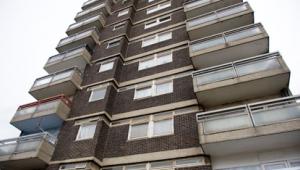Speaking at the National Housing Federation conference yesterday, Clark said he had been in discussion with the group, which represents housing associations, over the summer about how to implement the Conservative’s controversial pledge to extend discounted purchasing rights to housing association tenants.
As a result, the NHF has developed a proposal that is also intended to boost housing supply and maintain the financial independence of the sector, which could have been at risk if legislation was seen to nationalise their assets.
Under the terms of the voluntary proposal released by the NHF, each home sold would be directly replaced by housing associations.
Discounts on the value of properties would be fully funded by government, which the federation is consulting on with members this week.
Revealing the discussions between ministers and the NHF yesterday, Clark said any deal would represent a joint commitment to build more homes than have been built for decades.
Clark said that the proposal from NHF chief David Orr came in three parts:
"The first is that the opportunity of extending the Right to Buy will be embraced by the sector. In keeping with the housing association tradition to empower and meet the needs of their tenants, associations would give the chance – not just to some of your tenants, but to everyone who wishes to take it – to own their own home.
"The second part of David's proposal is that the sector will be a major force in building new homes. Every home sold would trigger a new home being built by a housing association, on a one-for-one basis. For every tenant who exercises the Right-to-Buy, our housing stock would rise by one.
“The third part of David's proposed agreement is to make an historic change, to provide the means for every tenant who wants to – new or existing – to have the opportunity to acquire a stake in a home that can increase over time."
This could make the scheme similar to shared-ownership properties currently offered by housing associations, where residents buy a share of the property and pay rent on the remaining percentage. They can then acquire further segments of ownership over time, up to 100%, though a process called staircasing.
Orr said he is confident that members will back the plan, which could then be formally submitted to government for approval.
“Housing association households could get the opportunity to realise their dreams of homeownership, and housing associations would be able to replace the homes sold, boosting the nation’s housing supply,” Orr added.
“It also means housing associations could retain the independence which has allowed them to channel billions of pounds in private investment into home building over the last 30 years.”
Responding to the proposals, New Local Government Network director Simon Parker noted that an agreement of this sort would mean the controversial plans would not be scrutinised in Parliament.
“However, there is no clarity over how the compensation for housing associations will be funded. It was previously announced that this would come by forcing councils to sell their highest value properties,” Parker added.
“We call for continued scrutiny and challenge of this proposed measure, which we believe will be devastating to councils’ ability to plan for what is right for their own areas. The government must increase the pot of money available to build social housing, and cannot simply rob Peter to pay Paul.”




















